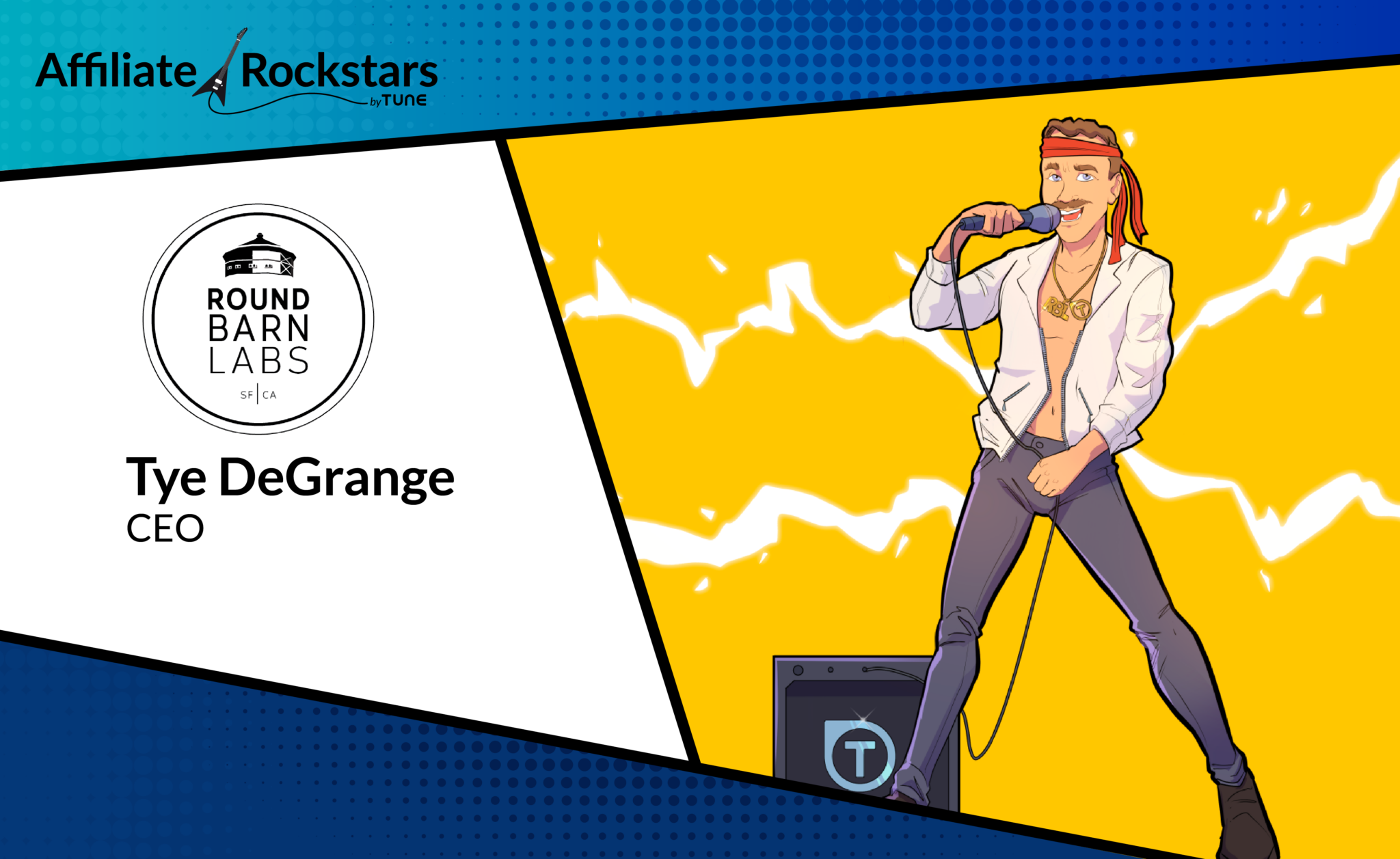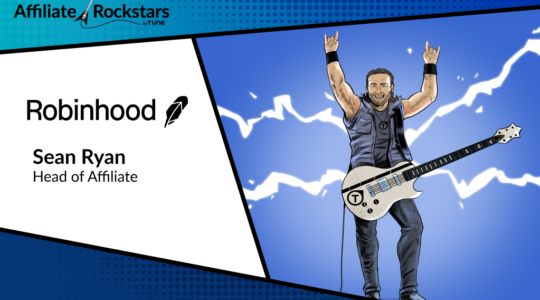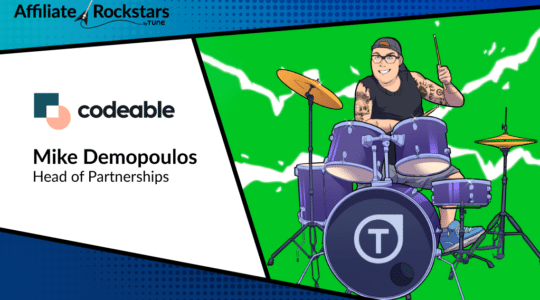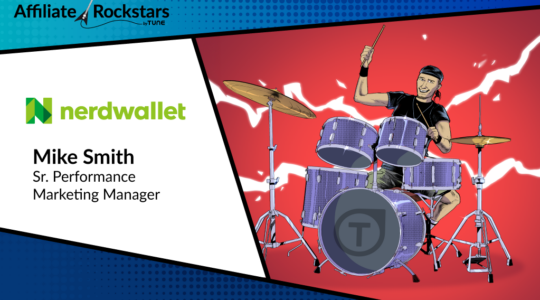
Introducing Tye DeGrange
Tye has been in performance marketing for nearly 20 years in-house at Fortune 500 brands and running his agency, Round Barn Labs. He has worked on brands like eBay, StubHub, ModCloth, Amazon, MetaQuest, Hatch, Future Fit, Atlassian, and Grammarly. When he is not helping his clients grow more efficiently, he loves helping his talented growing team and sharing learnings and insights on the Flywheel newsletter and the Always Be Testing podcast.
Rockstar Q&A with Tye
What are your day-to-day duties?
Dropping knowledge. I love education — both learning and teaching, and so much of our industry requires that. When I am not speaking to a client, at an event, or to a prospect to help them assess and navigate affiliate partner and influencer marketing, I am supporting our growing team ensuring they have the resources they need. I am setting the vision and plan for how we become the next great affiliate agency.
How did you get into the affiliate industry?
After working in direct response marketing in print and digital, then at one of the first VC-backed ad networks (display programmatic marketing), I was part of a great batch of talented performance marketers in the early days at Commission Junction managing advertiser clients like Bowflex and StubHub.
What’s the best thing you learned at the last conference you attended?
Deep dives with Levanta, Moonpull, and TrafficGuard. We are using all of them and find them to be great players to help move the industry forward in supporting improved affiliate marketing on Amazon, link tracking and auditing, and improving fraud protection.
Bringing smart people that are building world-class teams and products in once place is the core value.
What are your most important KPIs?
- 13-week cash flow
- Top-line revenue
- Net profit
- Net Promoter Score (NPS)
- % to plan for each client (based on their North Star metric)
What do you think is most undervalued in marketing in general?
- Brands are not running enough tests. They are not setting tests up correctly with appropriate documentation, and tracking and not memorializing the results and learnings to continue to improve their growth.
- YouTube and TikTok for some brands are being slept on.
- I also think that affiliate marketing (I say this a lot) is the most undervalued and misunderstood “channel” in performance marketing. If managed well, it can be your highest-performance CAC lever and can contribute 20% of revenue to your brand’s bottom line.
- Defining goals and terms like attribution and incrementality — too many people call this something that it is not, or do not define it clearly as a team. If they do define it, they are not setting up cost-appropriate tests to measure it effectively and make the hard decisions that come with attribution and incrementality testing.
“Affiliate” or “partner”? Why?
Affiliate, ’cause I put the “old” in old-school 😉
But I will say that some audiences (know your audience) have such a misguided or uninformed view of “affiliate” (after all, it is the most misunderstood lever in performance marketing) that I will use “partner” in some cases.
I have compared affiliate marketing to partner marketing light, in the way brands have partner teams internally that are working on large brand-to-brand partnerships.
These brand-to-brand partnerships have grown and become more important, and as affiliate tech has improved, more true brand partnerships can be run on strong SaaS tracking tools.
What’s the biggest mistake you’ve made in affiliate marketing?
Not investing in enough tracking rigor and resources upfront, and ensuring reporting is accurate and published in a timely way — while this was years ago and when I was an individual contributor, it is one of many lessons that informs helping great people perform and win to give clients what they need and when.
What are 2-3 (or more) trends you’re seeing in the affiliate industry?
- Increased scrutiny and requests to test and measure incrementality.
- Increased demand for data-driven attribution and insights.
- The decline of ease in tracking due to privacy changes increasing the need to improved tech and more reliance on first-party cookies and email rather than third-party cookies that are being deprecated.
- Cost increases in Google and Meta.
- Platforms like Amazon regarding brands to send traffic into their ecosystem and TikTok following suit.
- Continued growth in commerce content and influencers and brands chasing that with varying degrees of success.
What’s your top tip when it comes to negotiating affiliate deals with partners?
Put yourself in their shoes, genuinely think about what they want, don’t be afraid to be clear, and make the ask. Having some friendship rapport and trust with the partner helps and encourages you to invest in those friendships and relationships. Sometimes what is being said is not the whole story, so being willing and able to go a bit deeper or ask questions can uncover the true issue/need/challenge. Quid pro quo — if you are asking for something, be willing to give something in return.
How have your advertisers’ affiliate strategies changed over time?
We are seeing more and more requests for commerce content and influencers as part of a diversified approach to partner marketing.
What’s your ideal partner mix?
- Commerce content
- Influencer
- Loyalty with emphasis on discovery and conquesting — toolbar is monitored carefully
- BNPL
- Media buyers on a CPA (Google, Meta, TikTok)
- Connected TV
- Deal and coupon
- Amazon — Levanta
- Technology partners
Think you have what it takes to be an Affiliate Rockstar, or know someone who does? Apply or nominate them today.

Author
During his time as VP, Business Development at TUNE, Nate spearheaded the Affiliate Rockstars series, which aims to highlight the hard-working individuals in the industry and share their expertise with a wider audience. Nate received his BA in Social Sciences from Washington State University.



